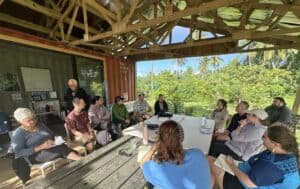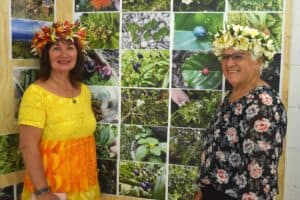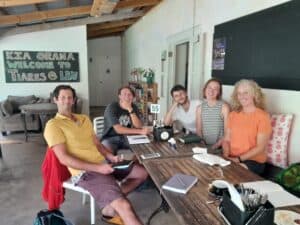Thursday 17 July 2025 | Written by Supplied | Published in Environment, National
As part of the ongoing GEF7-funded Project ENUA (Enhancing Nature’s Unique Areas), the University of Newcastle (UoN), Australia, completed their third field visit to Rarotonga from 2–9 of this month.
Dr. Troy Gaston, a freshwater and marine specialist who has been a key technical partner on water catchment assessments under Project ENUA, led the visit.
Joining him for the first time was Dr. Alex Callen, a terrestrial restoration expert, whose involvement adds valuable insight into the integration of ridge-to-reef management approaches across the project’s four priority catchments; Avatiu, Takuvaine, Avana and Turangi.
During their visit, the UoN team accompanied by NES staff conducted updated water catchment audits to gather further data and record potential variations since their previous visit. These catchments are critical for maintaining both terrestrial and lagoon ecosystem health, particularly in areas experiencing pressure from land-use activities, erosion, and nutrient runoff, so having good data on them will help inform management decisions and conservation actions now and in the future.
The team caught up with two key local NGO partners, Muri Environment Care (MEC) and Kōrero O Te ‘Ōrau (KO), who are both actively engaged in on-the-ground conservation, environmental monitoring and community awareness initiatives within these catchments. The meetings weren’t just sharing updates, they were about building on what’s already being done and working. It was a chance to explore how Project ENUA can help amplify and upscale the impact of their existing efforts. One exciting idea that was discussed was the Tiny Forest initiative, explained by Dr Alex Callen as a way to bring back native plants and restore small areas of land for maximised environmental benefits.
The visit helped strengthen collaboration between the research team, NES and community groups, ensuring that local knowledge, priorities, and initiatives remain central to Project ENUA’s goals. This alignment between scientific research and community action is essential for long-term, sustainable catchment management in the Cook Islands.
Looking ahead, the UoN team is scheduled to return in November, accompanied by 15 undergraduate students as part of Australia’s New Colombo plan. Their visit will focus on practical fieldwork, including water and lagoon health monitoring, further building on local datasets and offering students a hands-on learning experience in Pacific island environments.
Project ENUA continues to act as a catalyst for collaboration between local and international partners, working towards integrated catchment management that sustains the Cook Islands’ critical biodiversity and natural resources. NES



